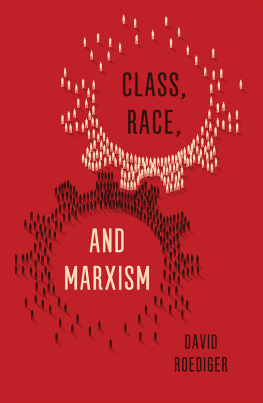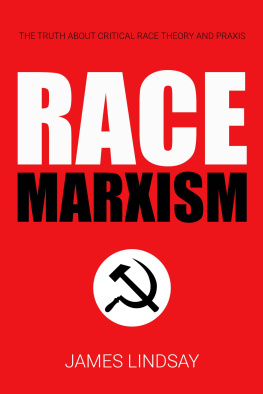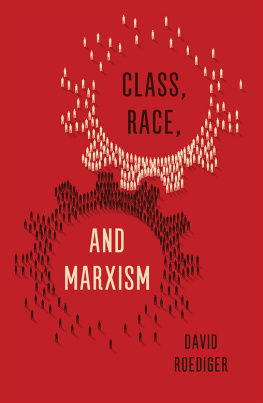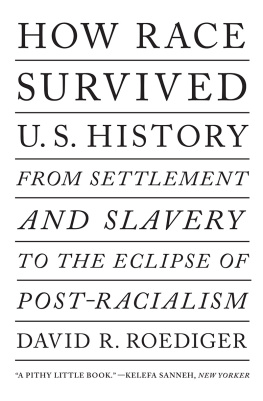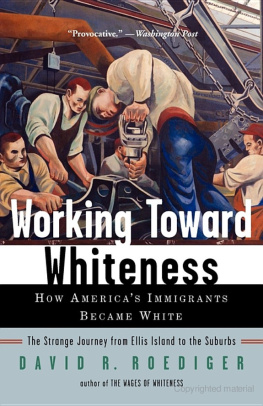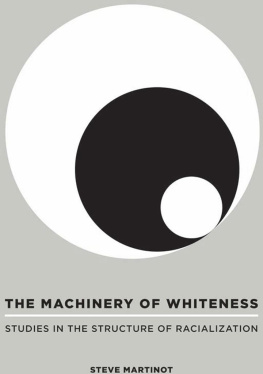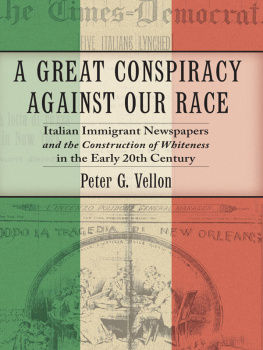David R. Roediger
Names: Roediger, David R., author.
Title: Class, race, and Marxism / David Roediger.
Description: New York : Verso, 2017.
Subjects: LCSH: Social classes. | Class consciousness. | Race relations. | Socialism. | Communism. | BISAC: SOCIAL SCIENCE / Discrimination & Race Relations. | SOCIAL SCIENCE / Social Classes. | POLITICAL SCIENCE / Political Ideologies / Communism & Socialism.
I n a book gathering work done over the course of a decade but reflecting thinking about these matters for four, acknowledgments cannot ever be adequate. I err here on the side of brevity and apologize for omissions. Everything I have written on race and class is informed by mentoring long ago from George Fredrickson, Margaret George, and George Rawick. Learning from Sterling Stuckey came early and continues to only grow. Outside of universities the Chicago Surrealist Group and especially Franklin Rosemont, Paul Garon, and Penelope Rosemont have been constant presences. Where psychology and contemporary social movements are concerned, my sons Brendan Roediger and Donovan Roediger have shared insights. Research assistance from Zach Sell, John Marquez, Stephanie Krehbiel, Martin Smith, Kathryn Robinson, and Hannah Bailey has helped greatly as has work from Edward G. Lee on web matters. I have run drafts and ideas by countless people, including Rebecca Hill, Paul Gilroy, Kevin Mumford, David Camfield, Vron Ware, Alberto Toscano, Dianne Harris, Michael Mizell-Nelson, Rachel Gugler, john powell, Joel Helfrich, Jean Allman, Jonathan Garlock, Noel Ignatiev, Nell Irvin Painter, Moon-Kie Jung, Thavolia Glymph, Richard Seymour, Tricia Rose, Robin D.G. Kelley, Joel Olson, Mark Leff, Clarence Lang, Rod Ferguson, Ferruccio Gambino, Enoch Page, Abigail Bakan, Enakshi Dua, Rose Feurer, Chad Person, John Bracey, Susan Ferber, Shawn Alexander, and George Lipsitz. At Verso Sebastian Budgen, Sophia Hussain, John Merrick, and Rosie Warren have been especially helpful. Coauthor on one of the pieces, as well as supportive and most perceptive critic on all, was Elizabeth Esch.
My research and writing benefitted from institutional support in the form of fellowships from the Illinois Program for Research in the Humanities, the Center on Democracy in a Multiracial Society at University of Illinois, the Center for Advanced Study at University of Illinois, the Mellon Foundation, and from residencies at University of South Carolina and University of Londons Queen Mary University. Thanks especially to Lawrence Glickman and to Gerry Hanlon for arranging the two residencies.
The essays originally appeared in the venues below and both the editors and editorial collectives involved improved them greatly in each case. They are reprinted with thanks:
Chapter 1: The Retreat from Race and Class. Monthly Review, 58 (JulyAugust 2006), 4051.
Chapter 2: Accounting for the Wages of Whiteness: US Marxism and the Critical History of Race in Wulf Hund, David Roediger, and Jeremy Krikler, eds., The Wages of Whiteness and RacistSymbolic Capital (Berlin: LIT, 2011), 936.
Chapter 3: The White Intellectual among Thinking Black Intellectuals: George Rawick and the Settings of Genius. SouthAtlantic Quarterly, 109 (Spring 2010), 22547.
Chapter 4: Removing Indians, Managing Slaves, and Justifying Slavery: The Case for Intersectionality in Sabine Ritter and Iris Wigger, eds., Racism and Modernity: Festschrift for Wulf D. Hund (Berlin: LIT Verlag, 2011), 11730.
Chapter 5: Coauthored with Elizabeth Esch, One Symptom of Originality: Race and the Management of Labor in US History. Historical Materialism, 17 (2009), 343.
Chapter 6: Making Solidarity Uneasy: Cautions on a Keyword from Black Lives Matter to the Past. American Quarterly, 68 (June 2016), 22348.
I n a recent symposium in the web publication Syndicate on his book Seventeen Contradictions and the End of Capitalism, the Marxist theorist David Harvey takes issue with one of his critics, the radical scholar of religion Alex Dubilet. Harvey objects to Dubilets contention that the struggles against police violence, municipal courts, and white supremacy that have matured in and beyond Ferguson, Missouri after the murder of Mike Brown are anti-capitalist ones. Frankly, Harvey writes, I dont see the current struggles in Ferguson as dealing very much in anti-capitalism. Instead he finds those struggles likely to recapitulate the long history in the United States of making sure that the anti-racist struggle does not turn anti-capitalist. In characterizing what he regards as the most fearsome challenge in his book for the US left, Harvey adds, None of these other struggles should transcend or supersede that against capital and its contradictions. Harvey gets matters quite wrong, but he starts us in a direction that is extremely useful for thinking about how we might work across disagreements where study and struggle regarding race and class are concerned.
Harveys position, featuring an iron distinction between antiracist and anti-capitalist (and elsewhere between revolutionary feminist and We are welcome to wishI do wishthat people in Ferguson talked explicitly about ending capitalism, though no one with political visibility in the United States ever does. But to assume that that their struggles are therefore not anti-capitalist ones seems formalistic in the extreme.
Nevertheless Harveys response to Dubilet refuses in an important way to politically pit race against class. He emphasizesthe verbs should be familiar from the first paragraph abovethat none of the political mandates flowing from his analysis of the contradictions of capital transcends or supersedes the importance of waging war against all other forms of discrimination, oppression, and violent The substance of the exchanges, and the broader question of whether the production of difference is in fact part of the inner logic of capital, forms the subject of the last section of this brief introduction.
Also noteworthy is the tone of Harveys remarks and those of his critics. By tone, here and below, I mean the authors attitude toward her or his subject matters and, in this case, opponents. Sharp differences are registered by Harvey and his interlocutors without total dismissal of the positions of others. The personal virtues of, and relationships among, the participants perhaps go some way towards explaining the healthy tone, but politics also matter. No participant in the symposium is intent on seeing race- (or class-) based initiatives described as diversions from the real struggle. Moreover, actual social motion in the last decade, from the immigrant rights marches and general strikes of 2006 to the local mobilizations against police murders of African-American young people named nationally as the Black Lives Matter movement, has so clearly given oxygen to US social movements that marginalizing race struggles is now difficult, yet still not without its aggressive advocates.

